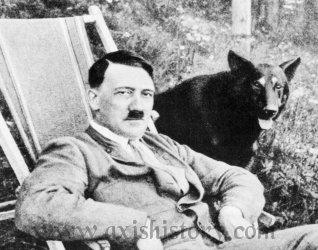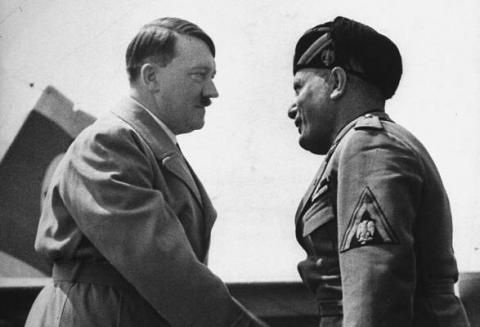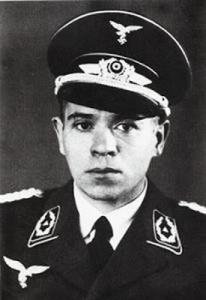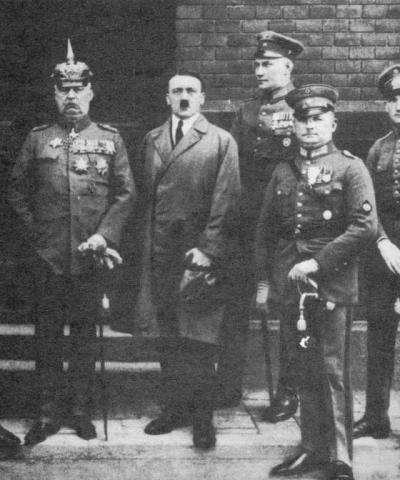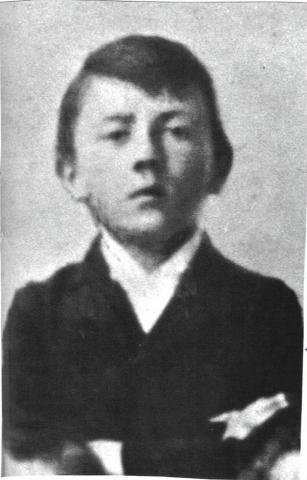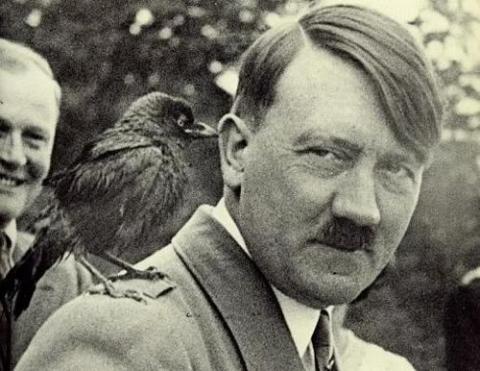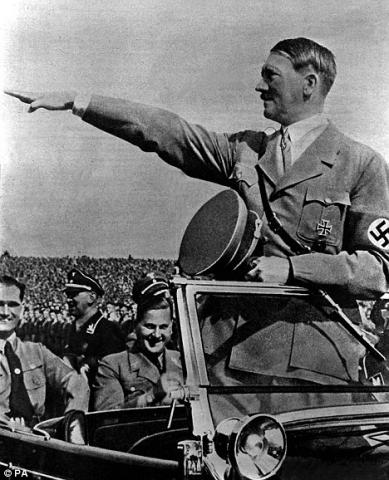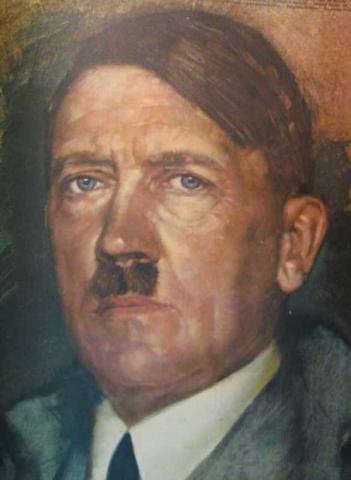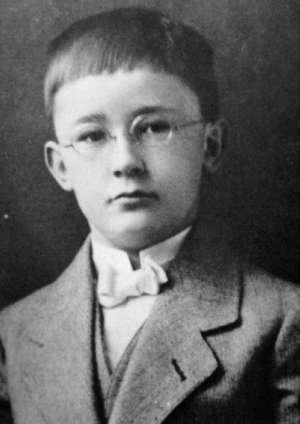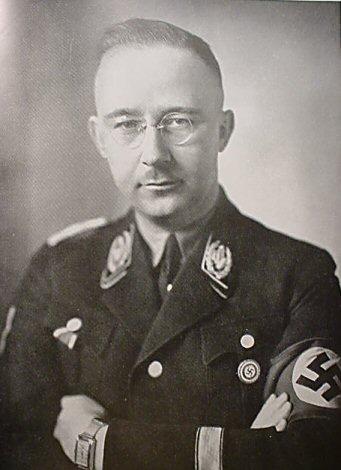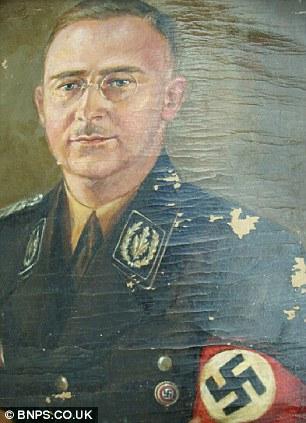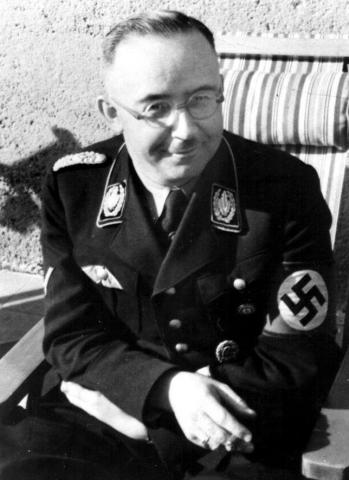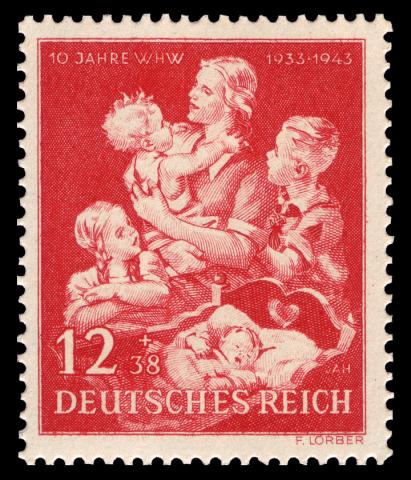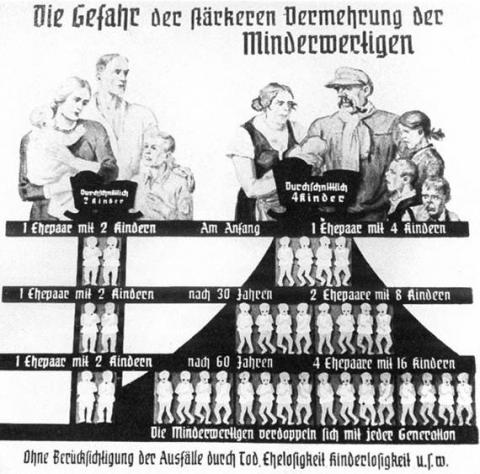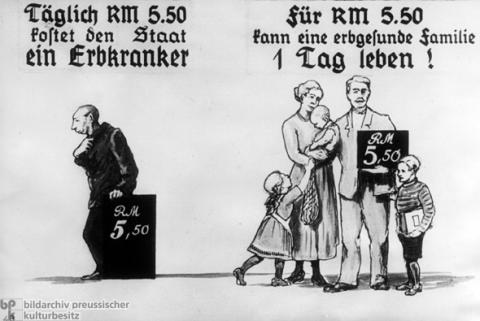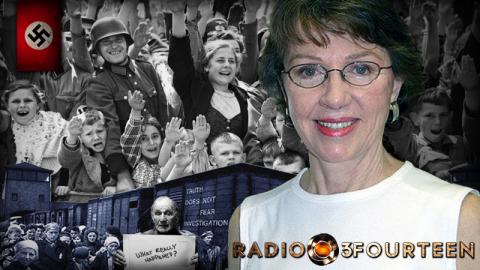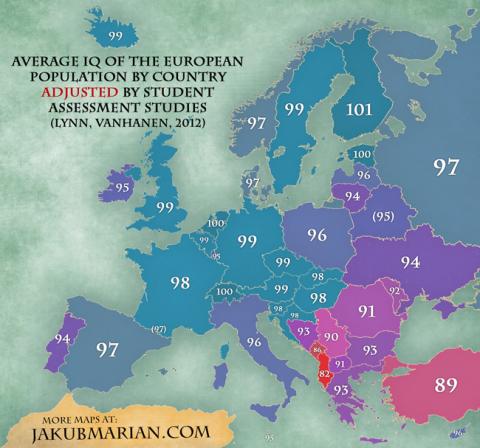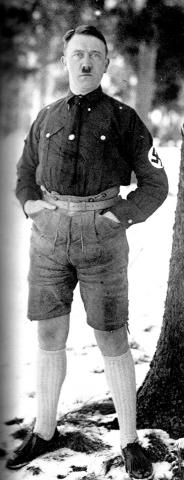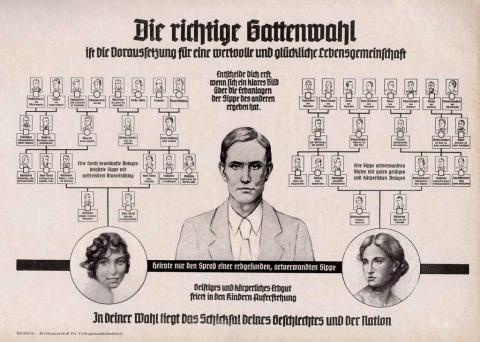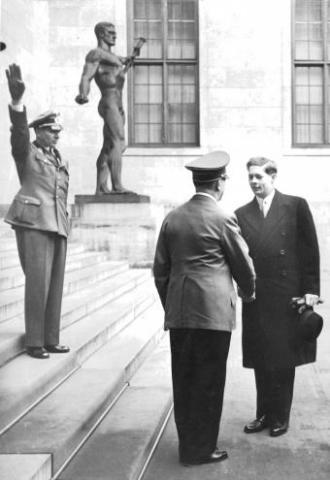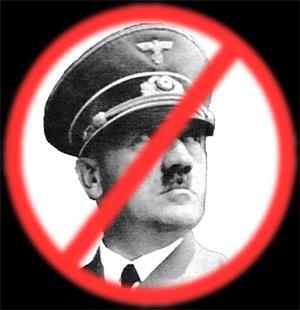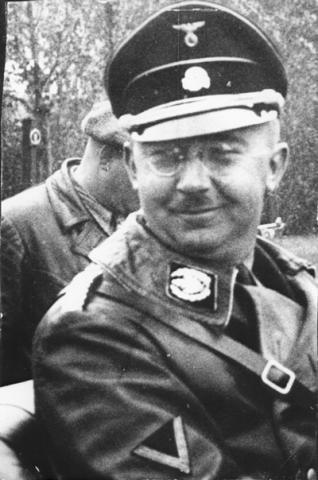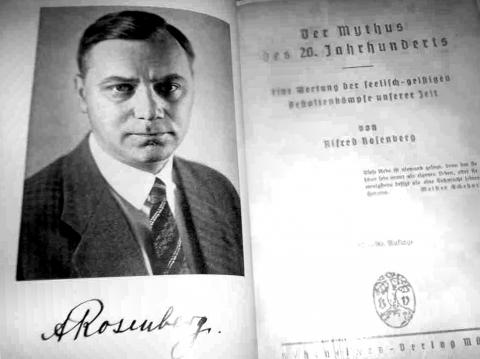This article is reposted from National-Socialist-Worldview.
This booklet by Dr. Frercks was originally published, with the approval of the NSDAP, in 1935. The edition on which this translation was based is dated 1942. Translation by Hadding Scott, 2014.
![german family stamp]()
Part 4 - Race and History
Every epoch has its own interpretation of history born of its spirit. In the Middle Ages reigned the universalist interpretation of history that judged all events according to their part in the preparation of the "Dominion of God on Earth." In this dominion all differences due to natural law among persons, peoples, and cultures would become irrelevant before the one all-embracing doctrine whereby life has its ultimate meaning in the soul cleansed of all earthly contents. By this conception, body and flesh are regarded as originating from this world, and are accordingly sinful and must be chastened in consistently pious exercise for the salvation of the soul.
To the question about the up and down in the life of peoples, about the rise and collapse of cultures, the age before us knew only one weary and hopeless response. It saw the historical life of peoples embedded into the destiny between life and death that repeats itself everywhere in nature, from which there was said to be no escape also in the life of a people. By analogy to the life of the individual person, the historians of the Enlightenment believed that the life of peoples played out in the same way. After brash youth supposedly followed the more mature age and finally the collapse into nothing. Gray prehistory, gloomy mediaeval period, enlightened and advanced modernity. Thus ran the schedule of history. One rejoiced to live in the modern age and to have a part in the progress of humanity. One interpreted the course of history as a line of ascending development that freed itself more and more from the primitive circumstances of nature and hastened toward that dominion in which no longer dark destiny but reason and clarity of knowledge were supposed to rule.
The Racial Question is the Key to World-History
Our own prehistory has been compared with the condition of certain primitive peoples still living today at the level of the Stone-Age. Without concern for the different racial substance and how this determines a people's destiny, comparisons were drawn. Hereditary tendencies, the inner potential of a race, were still locked secrets. And it is these that enable one people to produce cultural achievements of eternal value, but cause a different people to remain at a standstill, permanently unproductive at a primitive level.
Today we have behind us decades of an exact science, especially the studies of race and heredity, the results of which form the basis of our knowledge about the hereditary quality of our people. They have shown us that people and spirit, body and soul, are inseparable, that the two form a unity of life.
The idea and concept of race today stand at the center of intellectual, ideological, and educational disputes, and have also fundamentally altered our picture of the course of history. The introduction of thought about racial policy means for us a break with all those notions that believed that human history and culture were understandable from the perspective of spirit alone. In the future the natural history of peoples also will be part of the picture of the world and the understanding of it.
For the racial interpretation of history, world-history can only be a history of racially determinate ethnicities. The premise underlying this view is that tendencies not only of the body, but also of the mind and soul, are passed on from generation to generation, and only through them are cultures created and maintained. Race, the organic unity of body, mind, and soul, is the bearer and creator of all manifestations of the life of a people, as these in turn are only an expression of the people's race.
Decline of the West?
Although cultural peoples may have perished and been extinguished forever from history, this is still not a process of natural law, but ascribable instead to other causes. A people can be immortal if it is itself healthy and strong and has the will to life and immortality. Then however the process and meaning of history in its substance is to be placed in the race of the peoples themselves, and only biological decay is to be regarded as a cause of the death of a people. The destiny of peoples is accordingly bound to the destiny of its racial carriers; only when these die out does the people too perish with them, and another people perhaps still bearing the old name replaces them, but it never represents the people as it had been, in the proper form given to it by the creator.
Part 5 - The Racial Policy of National-Socialism
Examinations [of history] with regard to race and natural law teach us that there are three things that constitute the value and the strength of our people, which maintain its survival upon this Earth, but which will also bring its destruction without pity if disregarded:
1. the number and size,
2. the hereditary competence, and
3. the character of a people.
Over the long term in history a people can only be powerful and significant if it is large and rich in numbers; it sinks into insignificance if this declines.
Not however number alone, but first the quality and competence of a people's particular hereditary lineages condition the level of its culture. If a people's hereditarily competent lineages are degraded through faulty selection, its cultural achievements change accordingly.
The character of a people however is conditioned by the purity of its blood. If this becomes mixed, then its expression, its innermost life, also changes. The people becomes uncertain when faced with the most important questions of its existence.
How do we stand in regard to these questions about the life of a people? Are we too already on the way downward to our demise? Is our number declining, are the competent dying out, and are the inferior increasing? How do we stand regarding the maintenance of the purity of our blood? Let us investigate these questions one by one.
Part 6 - Is Germany Still a Growing People?[1]
As soon as there is reference anywhere to the dangerousness of the situation in our population-policy, to the increasing senescence of our German people and to the low number of births, usually two counter-arguments are persuasively stated that are supposed to show our entire population-policy as the delusional endeavor of some fools. These are, first, the fact that the German people is still increasing numerically, and, second, unemployment. It is a rock-solid certainty -- so it is said -- that our people has increased enormously since the previous century, and even endured the severe jolt of the World-War in a manner worthy of admiration, so that even the span from 1925 until the last census in 1933 produced growth. And then -- and with this it is believed that we have been utterly beaten -- one must consider the economic distress in our country, the great adversity and the misfortune of unemployment that indeed oppose every call for families rich with children.
Such assertions, that our people has continued growing in the last decades and that today the bad economic situation has an oppressive effect on many folk-comrades, are indisputable, if they are considered as isolated facts. But they do not suffice for seeing where our people's life as a whole stands.
The German People is Burdened with the Mortgage of Death[2]
The life of the nation is diverse; old and young generations have a share in its structure, and in every moment death and birth intervene in this multitude of manifestations, changing the total picture. If we want to judge the vigor and the biological strength of a people, it does not suffice only to declare the total number; rather we must observe the increase or decrease of a people's fecundity. Here, at the junction of the generations, the life of a nation is decided, whether it wants to continue growing and to arrange a future for itself, or whether it wants to effect weary resignation toward everything that preserves hope for an unknown future.
With such an assessment however one must affirm that the biological will to live of our German people is seriously dwindling, and that since the turn of the 20th century the number of births has declined so steeply that already today it no longer suffices even for maintaining the population. If the absolute number of the people has not declined but has continued rising for the time being, the reason is that due to medical advances, especially in the question of combating epidemics and in combating infant mortality, the number of deaths has declined very sharply, and we have accordingly many more older persons in our population-structure. This section of the population between the ages of 40 and 50 is significantly augmented furthermore by the fact that it issues from the fertile vintages of the decades before 1900. It is clear however that as soon as these generations enter the age of natural mortality, the number of deaths must rise in turn. This will be the case in roughly 10 to 20 years. We must soberly affirm, therefore, that Germany likewise is on the fastest path to becoming a dying people and to implementing the grisly utterance about the 20 million too many[3].
Economic Factors and Declining Birthrate
Many have now said that this decline in the number of births, perhaps to be expected over a very short period, is a necessary consequence of the bad economic conditions, and that the human consciousness of responsibility has regulated procreation, and must continue regulating. This view is wrong for two reasons: first, because the decline in the birthrate started already after 1876, and in a stronger form after 1900, thus in a time of highest economic prosperity; second, because it affected exactly the classes of the people that were experiencing no economic distress and that would have had enough space and air for a large number of healthy children. It was the circles of the intelligentsia, of the higher civil servants, officers and professors: one to two children per family was the average. Only much later did impoverishment of children, or rather childlessness, become "fashionable" in the middle class and even later among manual laborers, but among the latter only in the post-war period, when economic factors doubtlessly played a part. These last one to two decades however are meaningless compared to the fact that an essentially healthy nation has for two generations accepted the lessening of the number of its children and lost the will to live.
It could be said that nature acted frivolously when she left it up to the free will of the individual to decide whether or not the stream of life should come to a standstill. The idea seems frightening in its implications, that already countless competent and healthy families since a lifetime ago have set about cruelly and cynically throttling, never again awakening to new and young life, all that generation upon generation has assembled in the way of genetic legacy. Bitter it is, if distress alone determined people for such a choice. But this is in fact mostly not the case; instead people want to live it up and want in their short life to have a share of the so-called enjoyment of life and to bypass all of life's hardships. They do not know that their miniscule something compared to infinitely large life is a nullity, which however falls completely into insignificance and eternal death if it decides to be the end of a long series of generations. Whenever this has happened however, that the essentially healthy and highly valuable hereditary lineages voluntarily forgo procreation, then a people's will to self-preservation is seriously dwindling, and in the biological sense one can no longer properly speak of life, if the will for posterity, which is one of the essential properties of life, is lacking.
____________________________________
1. The title of this chapter, "Is Germany Still a Growing People?", is incongruous insofar as Germany (Deutschland) is a country (Land), not a people (Volk). This incongruity may have been necessitated by the political circumstances of 1935 when this book was initially published. At that time, National-Socialist Germany was still weak and had to avoid provoking neighboring states that had significant ethnic German populations, especially Poland. It seems likely therefore that this awkward title, with "Germany" substituted for the Germans, was chosen on political grounds to limit the discussion formally to the part of Germandom that was at that time governed from Berlin.
2. Die Hypothek des Todes, "the mortgage of death," is an idiomatic expression. In the 19th century, a person with tuberculosis was said to be living with die Hypothek des Todes, which obviously means something like the English expression living on borrowed time. In the 20th century die Hypothek des Todes seems to have become strongly associated with the kind of looming demographic crisis that Frercks describes here.
3. "Il y a 20 millions d'Allemands de trop," said French Prime Minister Georges Benjamin Clemenceau in response to the proposal to include Germans and Austrians in the post-war food-relief program that lasted from 1 December 1918 to 30 June 1919:
When Clemenceau was told that there were 20 million German and Austrian women and children on the verge of starvation, he said: "Let them starve! There are 20 million too many of them now!" But [Herbert] Hoover insisted on feeding them, declaring, "We never have made war on women and children, and it is too late to begin now." [The Southeast Missourian, 14 September 1928]
Part 7 - Consequences of the Decline in Births
Threat to the Nation
Already in the very near future that we ourselves shall yet witness if the process continues the way it has, after the initial decline in births must necessarily occur a more obvious decline in the total population, which then in a few decades will inevitably call forth the menace to the weal and woe and the existence of all. History tolerates no empty or weakly populated spaces, and the pressure of Slavdom's politics of population can become a menace to the existence of the German nation. This menace cannot be escaped even by one who believes that he is acting especially cleverly today when he says, My child should someday have it easier than I. This way of thinking is shortsighted and, if it is not prevented from continuing to influence how the future unfolds, will also ultimately threaten the individual in the security of his existence.
Economic Endangerment of the Individual
And even if the people or the individual remained unaffected by these political consequences, the economic consequences of the decline in births would still be felt by every individual. Who is supposed to feed him when he himself someday is old and alone and the strength of his hands no longer suffices to earn sustenance? The acquisition of means for the care of the elderly and invalids will be more difficult from year to year, accordingly as the healthy, work-capable, and tax-paying age-groups decline in number. If it is objected here that the decline in births is a consequence of unemployment, this represents a fatal fallacy. The youth of a people makes itself felt in the labor-market always only after the age of 16. Until then it represents in the economic life of a people a so-called class of non-producing consumers that brings work and bread to many hundreds of thousands of persons, given that all manufactured goods that belong to daily life must be produced for them.[1]
Heritage Imparts Duty
It was a materialistic age that made the child into a matter of arithmetic. For the National-Socialist state the congenitally healthy, child-rich family represents the foundation of a healthy people. Therefore it is necessary that every individual understand clearly that his personal destiny as an individual recedes in importance by comparison, that he, regarded in terms of the biology of the people, is only a bearer of the hereditary matter and hereditary substance that has come down to him from his ancestors of several thousand years ago. It is the heritage of the most obscure prehistory that is actuality in us, and all those ancestors about whom no account any longer reaches us, who only once in a while in ancient troves give us a clue about their ancient culture, have not completely vanished; rather a piece of them lives in each of us. This however links the individual to the most distant past and at the same time lets him be the beginning for an unknown future in which he can become a part. Thus the individual is not a detached something that accidentally lives among a number of persons, but is only a link in the chain of life, from which he cannot separate himself. It is the hereditary line of the generations before him that has come down to him and that demands the connection with another hereditary line, so that the chain of life is not broken and the stream of the blood in a people does not run dry, but flows onward into more distant ages.
____________________________
1. Americans immersed in the simplistic economic ideology promulgated in the USA since the late 1970s may find it paradoxical that a class of non-producing consumers "brings work and bread to many hundreds of thousands of persons." Of course from a strictly individual perspective, "non-producing consumers" would appear to be simply a drain on wealth, but the verdict from the perspective of society as a whole is different. In an industrial society, because of the way machines multiply the productivity of labor, excess productivity develops, and an ever-diminishing demand for labor results from that. For ordinary people this means a scarcity of well-paid full-time jobs, and this in turn means for the industrialist that not many people have disposable income to buy the goods that he produces. When, however, there are many children in a society, forming a class of non-producing consumers, the added demand for goods and services means less unemployment, and the increased distribution of disposable income then further increases the demand for goods and services. This economic role of a large population of children, and the negative economic effect of having few children, is a point of central importance in Lawrence Dennis' books The Coming American Fascism (1936) and The Dynamics of War and Revolution (1940). There is a way to reduce the bad economic impact of a deficiency of children -- if further increase of population is inadvisable -- but it involves large-scale economic intervention by the government, eliminating the mismatch between the supply of labor and the demand for labor. Thus Lawrence Dennis predicted "fascism" for the United States as the eventual solution to the crisis caused by the cessation of large families at the end of the 19th century. (Although different in some other respects, in terms of economic policy, fascism and national-socialism are effectively the same.) In National-Socialist Germany, direct creation of jobs by the government was practiced along with encouragement of child-bearing, and in fact the two measures are synergistic, if it happens to be true that an economically secure couple is more likely to produce children.
Part 8 - Why Prevent Congenitally Ill Progeny?
Who is Congenitally Ill?
Just as the healthy tendencies of humans are inherited, so are unhealthy tendencies, which can produce mental illnesses, bodily deformities, or signs of devolution, passed on from generation to generation. We then have to deal with hereditary suffering that we cannot through any power in the world eliminate in the current carriers. The congenitally ill person is ill in his inmost composition, and this surfaces sooner or later in him or his descendants. Thus whether it be a matter of a bodily affliction, deaf-muteness, deformity, or of mental illness and feeble-mindedness, the individual cannot escape this destiny, and also those that come after him are afflicted with these sufferings, whether they want it or not. Here is fulfilled the word of the Bible about the sin that propagates itself into the third and fourth generation.[1]
Not congenitally ill by contrast are all those that have acquired their illness through any external cause, for example infection or also accident. These influences can gradually change the person in his appearance, but his inner hereditary tendencies remain in every case unaffected by it. The great army of those maimed in war is perhaps outwardly crippled but nobody will on that account inherit his disability, but on the contrary, his healthy hereditary tendencies; he is congenitally healthy.
Law of Selection
![reproduce faster]()
National-Socialist Poster: The mentally inferior reproduce faster
For the competence and capability of the coming generations it is crucial in what number and in what proportion the congenitally ill and the congenitally healthy in a population reproduce. Through the climbing of birth-figures on one side, and through decline on the other side, the face of a people can be entirely changed in a few generations. Through the unlimited reproduction of congenitally incompetent elements their number in recent years has increased enormously, and has led to an unbearable burden for the community. This situation was furthermore promoted through the public accommodations that paid higher rates of support to the antisocial elements that were unable to support a family, than to those healthy families that had become jobless through no fault of their own.
![costs more]()
One congenital invalid costs as much as a healthy family
For congenitally healthy families on the other hand the founding of families was hindered more and more by anti-child tax-legislation, the prolonged period of apprenticeship, and the excessive mania for education. On top of this there is the ideological aversion toward children and toward the people's stream of heredity, an aversion that exists precisely in the higher social classes and was founded in materialism and in the crassest egoism of the individual wanting to acknowledge no community beyond himself. Much suffering and misfortune could have been avoided already in this area if in childhood the importance of these questions had been indicated and the conscience had been strengthened in this regard. An old Nordic proverb says: "Marry rather an ugly girl from good stock than a pretty girl from bad stock." The bygone age2 believed that it could disregard all these things and treat hereditary differences as having no bearing on the individual. It was supposed to be the environment that determined differences and therefore was responsible for whether someone was good or bad, for whether the one became a criminal or the other became productive. It was the delusion of an entire epoch that believed that by efforts in public assistance, by the construction of palaces for congenital incompetents, it was raising the essential health of the people as a whole. We have today perceived that this was a futile labor of love, and that all these efforts have occurred at the expense of healthy and congenitally competent folk-comrades. "It was we who at this point, with excessive humanity and erring compassion, violated the great law, and artificially kept alive what by the laws of God would have been long ago dead and gone." (Dr. Walter Gross.)
It stands as a crude deception if now perhaps it is said that we wanted to treat all those elements inhumanely. Our principle here is that the poorest and neediest folk-comrade who through the strength of his hands makes a productive contribution to the people as a whole especially has the right to support himself and his family in comfort. A state that does everything for idiots and mental incompetents, but lets its healthy folk-comrades perish, has given up and lost the moral justification for its existence. So that there may be no misunderstanding, let it be emphasized that a destruction of life which lacks the value of life [eine Vernichtung von lebensunwertem Leben], as was previously discussed in other circles, is not under consideration here, but it is being insinuated about us today by the opposing side to create bias against the populist racial policy.[3] In order to liberate the nation's stream of heredity from unhealthy hereditary traits, there is only one sure method, namely to prevent any further propagation by means of a small operation.
Christianity and Sterilization
Ever since 1 January 1934 when Germany took action through the Law for the Prevention of Congenitally Ill Progeny to approach this goal, from many sides the question has been raised of whether the planned measures are reconcilable with Christian religious doctrine. Not a few have protested that Christianity is a religion precisely of all who endure suffering and need assistance. Point conceded! But nonetheless this can never, ever mean that we should wearily bring up all that is weak and congenitally ill, and bring it to the point of producing many offspring, and that suffering should increase ever more in this way, and finally become a danger to the healthy life of the people and of the race! "If we have defended ourselves against it, if, fully recognizing our duties as humans and our duty of compassion, we have indeed made the decision no longer to allow such an unfortunate suffering and such unfortunate misery to survive among us, perhaps doubling or tripling in the next generations, then with that we have done a great deed for which our children and grandchildren someday will thank us." (Dr. Walter Gross)
Nature is crueler than our civilized life; the congenitally incompetent and unready for life perish without pity. It does not correspond to the conception of our age to imitate such methods of nature and thus, without compassion, to destroy everything weak. Precisely from the moral and ethical orientation of our conscience we are filled with satisfaction over the fact that it is today possible to preserve the life of the individual, but to protect the chain of generations against ever recurring illness.
The National-Socialist state is founded upon the actualized community of the people.It builds its work upon the great voluntary deed of the suppression of all private interests for the well-being of the collectivity. Woman has taken up this idea of the selfless community; she is prompted by Nature to allay distress and to help. Thus she has always advocated every beneficence and neighborly love, without regard for whether it happened within the great work of Christian caritas or in the realm of the state's social services to the people.
The new state has redirected the idea of loving thy neighbor from the individual to the collectivity and the subsequent generations of the people, and wants to avoid much suffering and grief for families through a small, harmless operation. This deed of loving thy neighbor, which seems to assist the current generation only slightly, but helps the children and grandchildren all the more in turn and prevents a perpetuation of all the great misery, will for this reason encounter understanding everywhere. Those engaged in this work see their finest reward when a sick man comes and says, "Yes, I do not want my suffering to continue in my children and children's children and spread even more suffering." With this decision, voluntarily to bring his unhealthy hereditary line to an end, he has made a sacrifice that the community of the people can recognize and appreciate utterly and entirely. With that the sick man has proven that he wants, within the realm of possibility, to play an orderly part in the state, and in no way does he retain the stigma of an inferior person. The state gladly continues to afford him protection and assistance to ease his difficult destiny.
__________________________
1. In Exodus 34:7 it says: "... yet He will by no means leave the guilty unpunished, visiting the iniquity of the fathers on the children and on the grandchildren to the third and fourth generations." (New American Standard Bible.) Essentially the same statement is repeated in Numbers 14:18.
2. With the Second World War that "bygone age," meaning the modern age of superficial Enlightenment-thinking that denied the biological nature of man, has been reestablished. This was a giant step backward in thinking, accomplished through force of arms.
3. Someone might reproach Frercks' statements about the willingness of the National-Socialist state to support congenitally ill persons by bringing up Hitler's euthanasia-decree of 1939. That secret decree partially contradicts the position stated here by Frercks in 1935, but it occurred under changed circumstances, and it does not reflect a general change in the government's position on congenitally ill persons. Hitler's euthanasia-decree was issued at the time of the outbreak of the war for the purpose of increasing the availability of hospital beds and medical personnel to deal with war-wounded. The euthanasia-decree was in no way a eugenic measure and was not comparable or related to eugenic sterilization. Eugenic sterilization in National-Socialist Germany was a much larger concern than euthanasia. Hundreds of thousands were sterilized in Germany beginning in 1934. By contrast, in the period 1939-1941 only about 71,000 were euthanized before the decree was withdrawn. Euthanasia was not a eugenic measure, because the individuals euthanized were -- at least in many cases -- in no position to reproduce anyway, and assuming that they had been, the goal of racial hygiene would have been served just as well, with less danger of causing dissension, by simply sterilizing them instead.
Go to Parts 1-3

